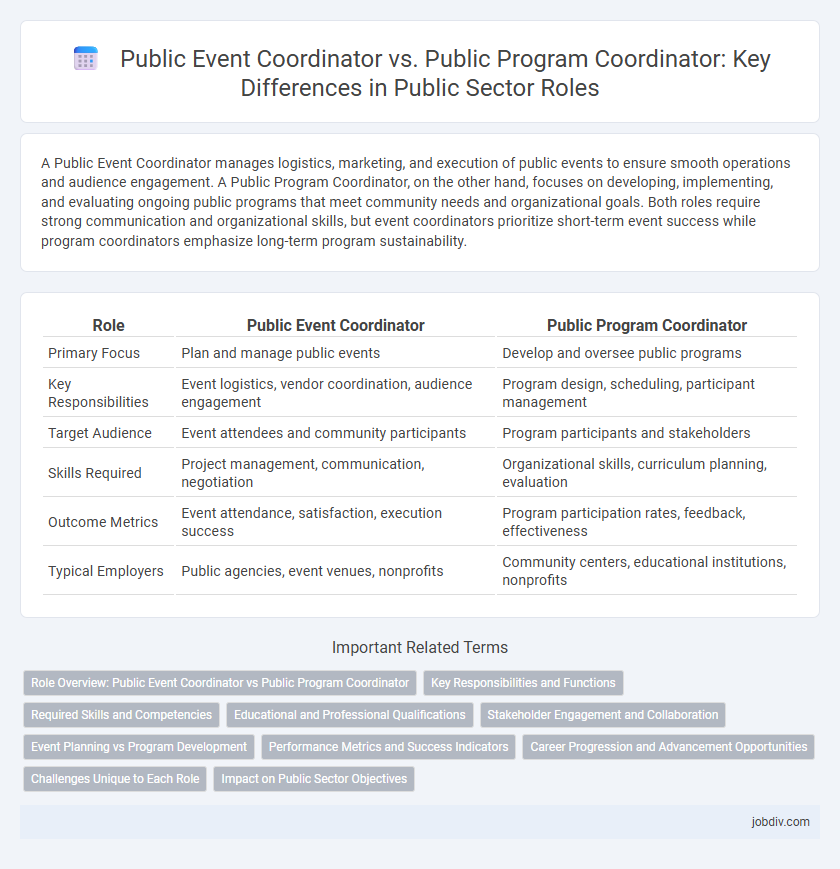A Public Event Coordinator manages logistics, marketing, and execution of public events to ensure smooth operations and audience engagement. A Public Program Coordinator, on the other hand, focuses on developing, implementing, and evaluating ongoing public programs that meet community needs and organizational goals. Both roles require strong communication and organizational skills, but event coordinators prioritize short-term event success while program coordinators emphasize long-term program sustainability.
Table of Comparison
| Role | Public Event Coordinator | Public Program Coordinator |
|---|---|---|
| Primary Focus | Plan and manage public events | Develop and oversee public programs |
| Key Responsibilities | Event logistics, vendor coordination, audience engagement | Program design, scheduling, participant management |
| Target Audience | Event attendees and community participants | Program participants and stakeholders |
| Skills Required | Project management, communication, negotiation | Organizational skills, curriculum planning, evaluation |
| Outcome Metrics | Event attendance, satisfaction, execution success | Program participation rates, feedback, effectiveness |
| Typical Employers | Public agencies, event venues, nonprofits | Community centers, educational institutions, nonprofits |
Role Overview: Public Event Coordinator vs Public Program Coordinator
Public Event Coordinators specialize in planning, organizing, and executing events such as conferences, festivals, and community gatherings, ensuring seamless logistics and attendee experiences. Public Program Coordinators focus on developing and managing ongoing programs aimed at community engagement, education, or social services, emphasizing participant outcomes and program effectiveness. Both roles require strong communication and project management skills but differ in scope, with Event Coordinators handling short-term events and Program Coordinators overseeing long-term initiatives.
Key Responsibilities and Functions
A Public Event Coordinator focuses on planning, organizing, and executing public events such as festivals, conferences, and community gatherings, ensuring logistics, vendor coordination, and attendee engagement are managed effectively. A Public Program Coordinator oversees the development and implementation of community programs, collaborating with stakeholders to align program goals with public needs, monitoring progress, and evaluating outcomes. Both roles require strong communication skills and project management expertise but differ in scope, with event coordinators centered on specific events and program coordinators managing ongoing initiatives.
Required Skills and Competencies
Public Event Coordinators require strong organizational skills, expertise in logistics management, and proficiency in vendor negotiation to execute seamless events. Public Program Coordinators must possess skills in program development, community engagement, and data analysis to design and assess impactful public initiatives. Both roles demand excellent communication abilities and adaptability to dynamic public environments.
Educational and Professional Qualifications
A Public Event Coordinator typically requires a bachelor's degree in event management, communications, or a related field, along with experience in logistics and vendor management. In contrast, a Public Program Coordinator often holds a degree in public administration, social sciences, or education, emphasizing program development and community outreach skills. Both roles benefit from strong organizational abilities, but the Public Program Coordinator usually requires additional expertise in curriculum design and stakeholder engagement.
Stakeholder Engagement and Collaboration
Public Event Coordinators specialize in organizing and managing events that involve direct interaction with community members, vendors, and performers, emphasizing hands-on stakeholder engagement to ensure event success. Public Program Coordinators focus on the development and implementation of long-term public initiatives, collaborating with government agencies, nonprofits, and community leaders to align program goals with public needs. Both roles require strong communication and relationship-building skills but differ in the scope and type of stakeholder collaboration, with Event Coordinators concentrating on event-specific partnerships and Program Coordinators overseeing ongoing stakeholder networks.
Event Planning vs Program Development
Public Event Coordinators specialize in event planning, focusing on organizing, scheduling, and managing logistics for large-scale public gatherings such as festivals, conferences, and community celebrations. Public Program Coordinators emphasize program development by designing, implementing, and assessing public initiatives that align with community needs and organizational goals. Both roles require strong communication and project management skills but differ in the scope of activities, with Event Coordinators handling discrete events and Program Coordinators managing ongoing program cycles.
Performance Metrics and Success Indicators
Public Event Coordinators prioritize metrics such as attendance rates, participant engagement, and event budget adherence to measure success. Public Program Coordinators focus on program completion rates, participant satisfaction scores, and community impact assessments to evaluate effectiveness. Both roles emphasize timely execution and stakeholder feedback as key performance indicators.
Career Progression and Advancement Opportunities
Public Event Coordinators typically advance by gaining experience managing larger, more complex events and moving into senior event management roles. Public Program Coordinators often progress by developing expertise in program development, evaluation, and community engagement, leading to program manager or director positions. Both career paths offer opportunities for leadership growth, but program coordinators may have broader organizational advancement options due to their involvement in strategic planning and stakeholder collaboration.
Challenges Unique to Each Role
Public Event Coordinators face challenges such as managing large crowds, ensuring venue safety, and coordinating with vendors and speakers under tight deadlines. Public Program Coordinators encounter unique difficulties in designing educational content, aligning programs with organizational goals, and securing ongoing funding. Both roles require strong communication skills but differ in their operational focus and stakeholder engagement strategies.
Impact on Public Sector Objectives
Public Event Coordinators optimize community engagement through organizing and managing public gatherings that directly promote government initiatives and enhance public awareness. Public Program Coordinators design and implement strategic programs aligned with policy goals, ensuring measurable improvements in public service delivery and community well-being. Both roles contribute significantly to achieving public sector objectives by fostering transparency, participation, and effective resource utilization.
Public Event Coordinator vs Public Program Coordinator Infographic

 jobdiv.com
jobdiv.com